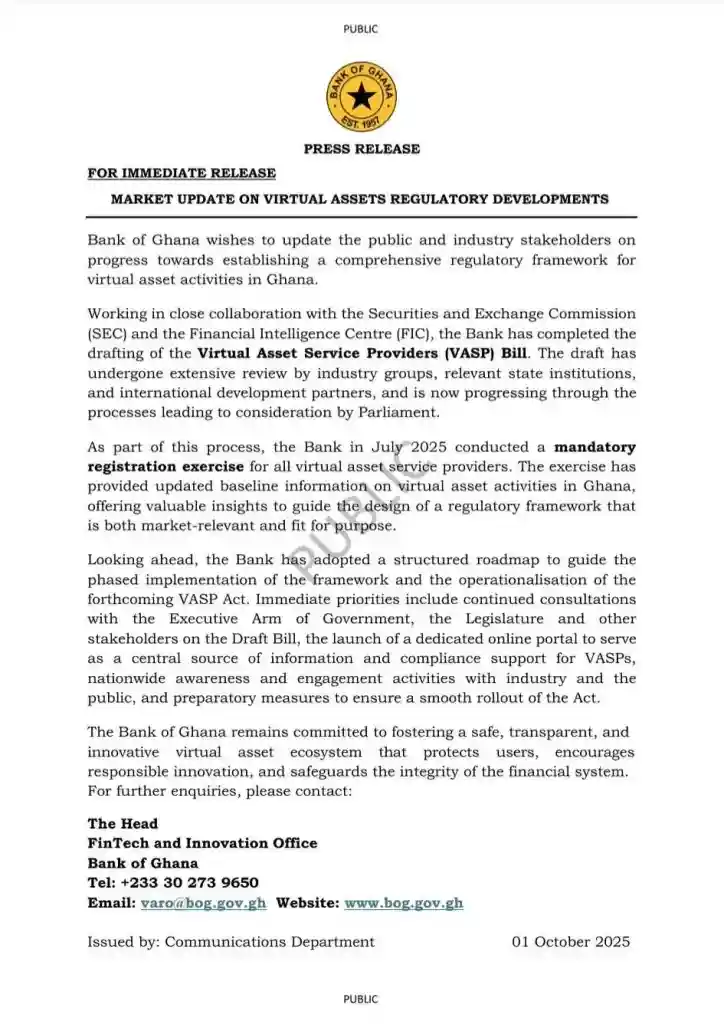The Bank of Ghana (BoG) has finalized its much-anticipated crypto regulation bill and is now awaiting Parliament’s review. This milestone marks a significant step toward formalizing digital asset activities nationwide. The new legislation aims to establish a clear and robust framework that strikes a balance between innovation and consumer protection.

Crypto Regulation Bill Aligns with Growing Virtual Asset Adoption
Over recent years, Ghana has emerged as one of Africa’s most vibrant crypto markets. Interest in virtual assets is surging among retail investors, businesses, and fintech startups. This growth highlights the urgent need for legal clarity.
The BoG’s crypto regulation bill directly addresses this demand. It seeks to regulate virtual asset service providers (VASPs) and establish guidelines that promote transparency and security. The bill is designed to foster a healthy ecosystem where innovation can thrive without risking users’ funds or the broader financial system.
Read also: Nigeria Leads Sub-Saharan Africa’s Crypto Market with $92B
Mandatory Registration Exercise Pivotal in Shaping the Bill
In July 2025, the Bank of Ghana carried out a mandatory registration exercise for all virtual asset service providers operating in the country. This registration was crucial for gathering updated baseline data on Ghana’s cryptocurrency sector. The collected data provided key insights into the size, structure, and risks within the market.
According to the BoG, this registration helped shape the crypto regulation bill to be market-relevant and fit for Ghana’s evolving needs. The information gathered highlighted gaps and opportunities, which the bill now addresses comprehensively.
Related: Roqqu acquires Flitaa to enter East Africa’s crypto market
Key Priorities Underpinning the Crypto Regulation Bill
The Bank of Ghana has outlined several core priorities as it moves toward implementing the new law. These priorities aim to ensure a smooth rollout and effective enforcement:
- Stakeholder Consultations: Continuous dialogues are ongoing with government bodies, Parliament, and industry participants to refine the draft bill. These consultations ensure the legislation reflects the realities of the Ghanaian crypto environment.
- Launch of Online Portal: The BoG will introduce a dedicated online portal. This platform will serve as a central hub, providing compliance support, regulatory updates, and key information for virtual asset providers. Providers must use this portal to stay compliant.
- Public Awareness Campaigns: Nationwide awareness and engagement programs will educate both consumers and industry members. These activities aim to build trust, clarify regulatory expectations, and encourage responsible participation.
- Preparatory Measures: The BoG is taking steps to ensure that all systems, personnel, and processes are ready for the bill’s enforcement. This groundwork will facilitate a seamless transition once the law is approved by Parliament.
Crypto Regulation Bill Supports Ghana’s Digital Economy Ambitions
Ghana’s digital economy is rapidly expanding, with virtual assets playing a key role. The crypto regulation bill reflects the country’s commitment to embracing fintech innovation responsibly. By providing clear rules, the bill aims to attract foreign investment and boost local startup growth.
Virtual asset adoption in Ghana is not limited to individual investors. More businesses are exploring blockchain solutions, tokenized assets, and cross-border payment systems. The bill’s balanced approach will protect consumers while fostering an environment that encourages these innovations.
Read also: South Africa’s RocoMamas Adopts Bitcoin Lightning Payments
The Burgeoning Crypto Landscape in Ghana
Ghana’s crypto scene has been bubbling with activity. Trading volumes are rising, new projects are launching, and marketplaces are expanding. Social media buzz around cryptocurrencies has grown exponentially as educated youth and tech entrepreneurs become early adopters.
Multiple fintech firms in Ghana now offer crypto services alongside traditional banking. This convergence highlights the sector’s growing mainstream appeal. However, without regulations, risks loom large—from scams to money laundering.
The crypto regulation bill aims to reduce such risks. Proper oversight will promote industry professionalism and increase confidence among users. Ghana looks to position itself as a leader in Africa’s digital finance revolution.
Related: Luno Rolls Out Tokenised Stock Trading in Nigeria
Awaiting Parliamentary Review and Next Steps
With the BoG finalizing the crypto regulation bill, attention now shifts to Parliament. Lawmakers will conduct thorough reviews and debates. They may propose amendments to ensure the legislation matches national interests and economic goals.
Once Parliament passes the bill, the Bank of Ghana will activate the planned support structures, including the compliance portal and public education campaigns. The crypto market will enter a new phase under legal certainty.
Read also: Binance Pay Enters South Africa via Zapper Partnership
Conclusion: Ghana Ready for a Regulated Crypto Future
The Bank of Ghana’s completion of the crypto regulation bill signals a transformative moment for digital assets in Ghana. The careful groundwork, including mandatory provider registration and stakeholder engagement, reflects a mature approach to policy.
Ghana’s crypto market stands to benefit greatly from a clear regulatory framework. The bill promises protection for investors, stronger industry standards, and an enabling environment for innovation. As Parliament prepares to review the legislation, the country edges closer to fully embracing the potential of virtual assets within a secure, transparent legal system.
The future of virtual asset adoption in Ghana looks bright, backed by a crypto regulation bill built on solid insights and broad consultation.




